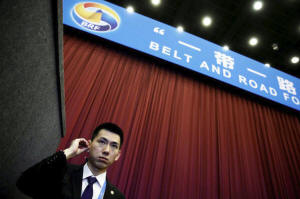|
Exclusive: China's Belt and Road
acquisitions surge despite outbound capital crackdown
 Send a link to a friend
Send a link to a friend
 [August 16, 2017]
By Kane Wu and Sumeet Chatterjee [August 16, 2017]
By Kane Wu and Sumeet Chatterjee
HONG KONG (Reuters) - Mergers and
acquisitions by Chinese companies in countries that are part of the Belt
and Road initiative are soaring, even as Beijing cracks down on China's
acquisitive conglomerates to restrict capital outflows.
Chinese acquisitions in the 68 countries officially linked to President
Xi Jinping's signature foreign policy totaled $33 billion as of Monday,
surpassing the $31 billion tally for all of 2016, according to Thomson
Reuters data.
Unveiled in 2013, the Belt and Road project is aimed at building a
modern-day "Silk Road", connecting China by land and sea to Southeast
Asia, Pakistan and Central Asia, and beyond to the Middle East, Europe
and Africa.
At a summit in May, Xi pledged $124 billion for the plan, but it has
faced suspicion in Western capitals that it is intended more to assert
Chinese influence than Beijing's professed desire to spread prosperity.

The surge in Chinese companies' acquisition-linked investments in the
Belt and Road corridor comes as the volume of all outbound mergers and
acquisitions from China has dropped 42 percent year-on-year as of
Monday, the Thomson Reuters data showed.
Beijing's move to prop up the yuan by restricting the flow of capital
outside the country and clamp down on debt-fuelled acquisitions to
ensure financial stability has made it tougher for buyers to win
approvals for deals abroad.
Regulators have tightened the screws further since June, reviewing deal
agreements in minute detail and ordering a group of lenders to assess
their exposure to offshore acquisitions by several big companies that
have been on overseas buying sprees, including HNA Group, Dalian Wanda
Group and Fosun Group.
The heightened regulatory scrutiny of overseas acquisitions comes after
companies spent a record $220 billion in 2016 on assets overseas, buying
up everything from movie studios to European football clubs.
The scrutiny, however, has not impacted Chinese companies' pursuit of
targets along the Belt and Road corridor, as those investments are
considered strategic for the companies as well as the Chinese economy.
"People are thinking in a long-term approach when making investments
along Belt and Road countries," said Hilary Lau, a corporate and
commercial lawyer and partner at the law firm Herbert Smith Freehills.
"The acquisitions are also policy-driven. There are funds allocated by
Chinese banks and state funds for Belt and Road deals," he said.

The number of Chinese deals targeting Belt and Road countries totaled
109 this year, compared to 175 in the whole of last year and 134 in
2015, the Thomson Reuters data showed.
[to top of second column] |

A security guard stands at the entrance to the opening ceremony of
the Belt and Road Forum in Beijing, China, May 14, 2017.
REUTERS/Thomas Peter/File Photo

APPROVAL PROCESS
Companies enjoy a relatively smooth approval process for deals along the
Belt and Road project as regulators tend to put them in a different
basket when reviewing outbound investments, according to lawyers and
dealmakers.
"If you are doing One Belt, One Road, that becomes the first
sentence in the document" to the regulators, said a senior
investment advisor at a Chinese company that has acquired several
overseas businesses.
"It is a wise thing to point out early on," said the advisor, who
requested anonymity because he was not authorized to speak to the
media.
Outbound deals currently take as long as six months to be approved
by Chinese regulators. However, Belt and Road investments tend to
get regulatory clearance within three or four months, according to a
Hong Kong-based senior M&A banker.
The largest deal in a Belt and Road country so far this year was a
Chinese consortium's $11.6 billion buyout of the Singapore-based
Global Logistics Properties <GLPL.SI>.
Other top deals include the $1.8 billion purchase of an 8 percent
ownership interest in an Abu Dhabi oil company by the state-owned
oil giant China National Petroleum Corp, and HNA Group's $1 billion
acquisition of a logistics company, CWT Ltd, which has not yet
closed.
The State Administration of Foreign Exchange, China's foreign
exchange regulator, said this month that domestic companies would
still be encouraged to participate in Belt and Road activities.

HNA, which has seen at least two overseas deals hit a hurdle as a
result of the crackdown on transferring money, has said it plans to
prioritize investments that are in industries and regions mapped out
under the Belt and Road initiative.
The belt and road acquisitions are predominantly in energy and
infrastructure sectors, said Hilary Lau of Herbert Smith Freehills.
"We've seen a lot of activities recently in Indonesia, Malaysia and
Myanmar. The whole Sri Lanka, India and Bangladesh corridor is also
hot as it's connecting the East and West," he said.
(Reporting by Kane Wu and Sumeet Chatterjee; Editing by Philip
McClellan)
[© 2017 Thomson Reuters. All rights
reserved.]
Copyright 2017 Reuters. All rights reserved. This material may not be published,
broadcast, rewritten or redistributed. |